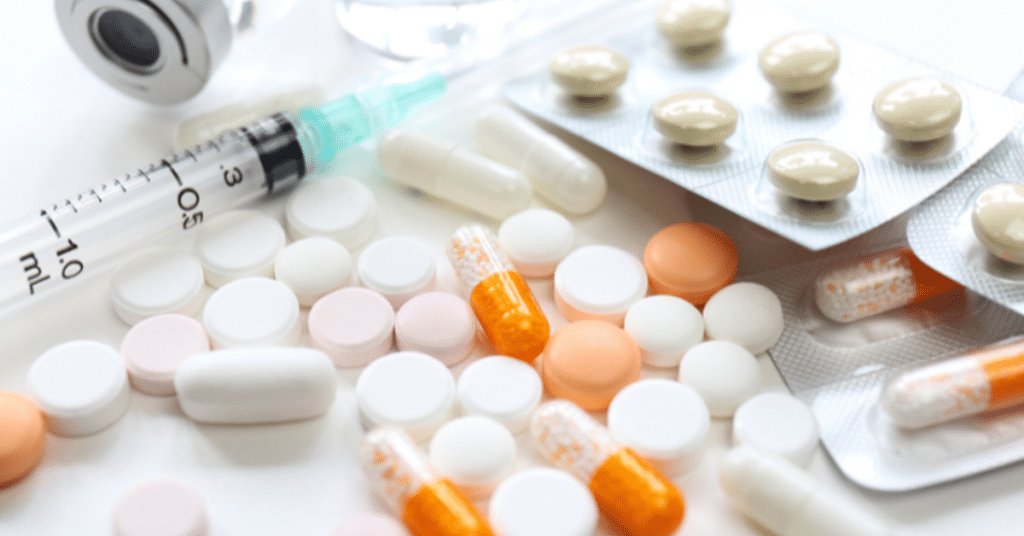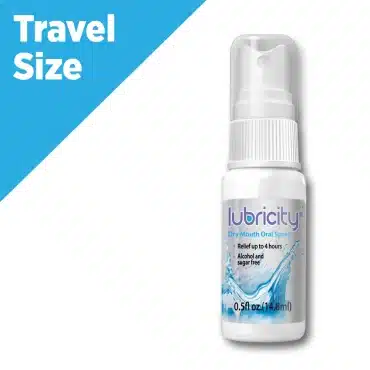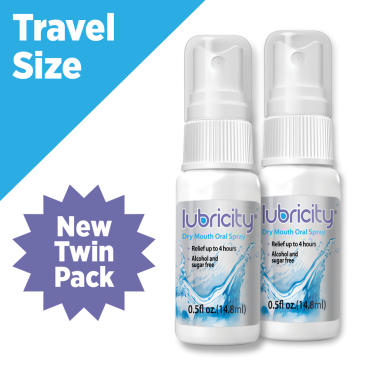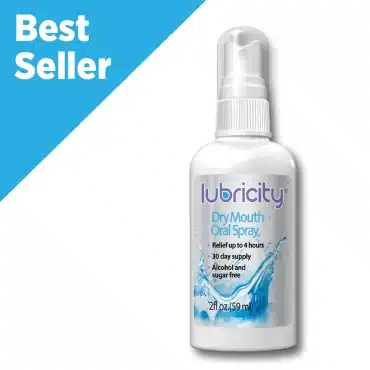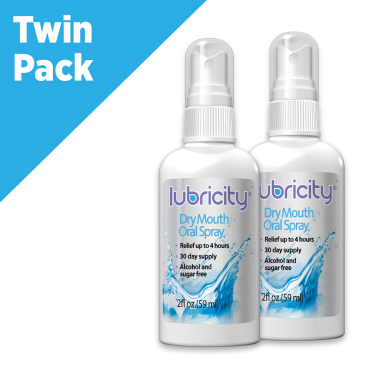A dry mouth, medically known as xerostomia, is a condition characterized by a lack of saliva production in the mouth. While several factors can contribute to dry mouth, including medical conditions and lifestyle choices, certain medications have been identified as common culprits. In this article, we will explore a comprehensive list of medications that can cause dry mouth and provide insights into managing this side effect effectively. We will also discuss a scientifically designed oral spray called Lubricity Dry Mouth Oral Spray, which can help provide comfort and relief to those suffering from symptomatic xerostomia.
Medications Associated with Dry Mouth
Several medications have been identified as potential causes of dry mouth. It is important to note that while these medications can trigger dry mouth, not everyone who takes them will experience this side effect. Additionally, the severity of dry mouth can vary from person to person. Here are some common types of Medications that cause Dry Mouth:
1. Antidepressants
Antidepressant medications, such as selective serotonin reuptake inhibitors (SSRIs), tricyclic antidepressants (TCAs), and monoamine oxidase inhibitors (MAOIs), are often prescribed to manage depression and anxiety. Unfortunately, these medications can interfere with saliva production, leading to dry mouth.
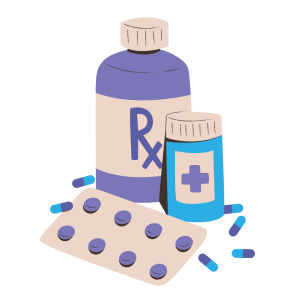
2. Antihistamines
Antihistamines, commonly used to treat allergies, can cause dry mouth as they inhibit saliva production. These medications work by blocking histamine receptors, which help alleviate allergy symptoms but can result in decreased saliva flow. Benadryl, an antihistamine medication, is known to cause dry mouth as a side effect. However, Lubricity Dry Mouth Oral Spray can provide relief from dryness in the mouth caused by antihistamines.
3. Decongestants
4. Antipsychotics
5. Muscle Relaxants
Muscle relaxants, often prescribed for muscle spasms and pain management, may cause dry mouth due to their impact on saliva production. These medications can affect the normal functioning of salivary glands, resulting in reduced saliva flow.
6. Blood Pressure Medications
Certain blood pressure medications, including diuretics and beta-blockers like Atenolol, have been reported to cause dry mouth. While the primary purpose of these medications is to manage hypertension, dry mouth can occur as an unintended side effect.
Moreover, these medications increase urine production, which may lead to dehydration and subsequently cause dryness in the mouth.
In addition, Losartan, an angiotensin receptor blocker (ARB) prescribed to manage high blood pressure, is not typically associated with dry mouth as a common side effect. However, individual responses may vary, and some people may experience dry mouth while taking losartan.
7. Opioids
Opioid pain medications, such as codeine and morphine, have been associated with dry mouth as a potential side effect. These drugs affect the central nervous system and can disrupt normal saliva production.
8. Anticholinergic Medications
Medications with anticholinergic properties, including certain medications for overactive bladder, gastrointestinal disorders, and Parkinson’s disease, can lead to dry mouth. These drugs block the action of acetylcholine, a neurotransmitter involved in saliva production.
9. Anti-anxiety Medications
Anti-anxiety medications, such as benzodiazepines, may contribute to dry mouth as a side effect. These drugs are commonly prescribed for anxiety and panic disorders but can interfere with normal saliva flow.
10. Antacids
Why Do Medications Cause Dry Mouth?
You might be wondering why certain medications have the side effect of dry mouth. The underlying mechanism can vary depending on the specific drug, but here are some common ways medications can lead to decreased saliva production:
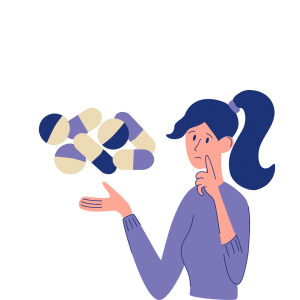
Reduced nerve stimulation: Some medications interfere with the nerves that control salivary gland function, resulting in decreased saliva production.
Altered blood flow: Certain drugs can affect blood vessels, reducing the blood flow to the salivary glands and subsequently impacting saliva production.
Chemical composition: The chemical properties of certain medications can directly inhibit saliva production or alter the composition of saliva, leading to dryness in the mouth.
Managing Dry Mouth Symptoms with Lubricity Dry Mouth Oral Spray
If you are experiencing dry mouth as a side effect of medication, incorporating Lubricity Dry Mouth Oral Spray into your routine can provide much-desired comfort and relief. This oral spray offers targeted lubrication and hydration to alleviate the discomfort associated with symptomatic xerostomia.
Lubricity Dry Mouth Oral Spray works by moisturizing and lubricating the oral tissues, providing a soothing and hydrating effect. Its unique formula helps restore moisture in the mouth, relieving dryness and promoting better oral health. By coating the oral tissues, the spray provides long-lasting hydration and comfort.
What sets Lubricity Dry Mouth Oral Spray apart is its convenience and ease of use. The spray can be applied directly to the mouth, making it a practical solution for on-the-go relief. With just a few sprays, individuals can experience immediate comfort and relief from dry mouth symptoms.In addition to using Lubricity Dry Mouth Oral Spray, there are several other tips to effectively manage dry mouth symptoms:
- Stay hydrated: Sip water frequently throughout the day to keep your mouth moist. Avoid caffeinated beverages and alcohol, as they can contribute to dehydration.
- Chew sugarless gum or suck on sugarless candy: Stimulate saliva flow by chewing sugarless gum or sucking on sugarless candy. Look for products containing xylitol, which can help prevent tooth decay.
- Use a humidifier: Add moisture to the air, especially during sleep, by using a humidifier in your bedroom.
- Practice good oral hygiene: Brush your teeth and tongue regularly with a soft-bristled toothbrush and fluoride toothpaste. Consider using a mouthwash specifically designed for dry mouth to help moisturize the oral cavity.
- Use saliva substitutes: Over-the-counter saliva substitutes or artificial saliva products can provide temporary relief by moisturizing the mouth and relieving dryness.
- Avoid tobacco and alcohol: Both tobacco and alcohol can exacerbate dry mouth symptoms, so it’s best to avoid them altogether.
- Consult your healthcare provider: If dry mouth persists or becomes bothersome, consult your healthcare provider. They may recommend adjusting your medication or prescribing artificial saliva substitutes.
By incorporating Lubricity Dry Mouth Oral Spray into your routine and following these tips, you can effectively manage the discomfort associated with dry mouth caused by medications. Lubricity Dry Mouth Oral Spray offers a reliable and convenient solution, providing relief and improving the overall quality of life for those suffering from dry mouth symptoms. Remember to consult your healthcare provider for personalized advice and guidance tailored to your specific needs.
What do customers say about Lubricity Dry Mouth Spray?


